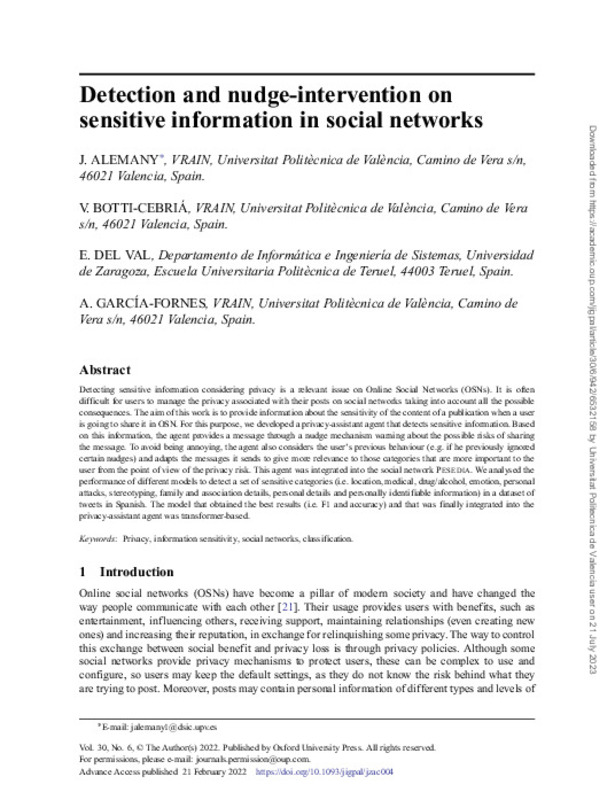JavaScript is disabled for your browser. Some features of this site may not work without it.
Buscar en RiuNet
Listar
Mi cuenta
Estadísticas
Ayuda RiuNet
Admin. UPV
Detection and nudge-intervention on sensitive information in social networks
Mostrar el registro sencillo del ítem
Ficheros en el ítem
| dc.contributor.author | Alemany, J.
|
es_ES |
| dc.contributor.author | Botti-Cebriá, V.
|
es_ES |
| dc.contributor.author | Del Val Noguera, Elena
|
es_ES |
| dc.contributor.author | García-Fornes, A
|
es_ES |
| dc.date.accessioned | 2023-10-17T18:01:37Z | |
| dc.date.available | 2023-10-17T18:01:37Z | |
| dc.date.issued | 2022-11-23 | es_ES |
| dc.identifier.issn | 1367-0751 | es_ES |
| dc.identifier.uri | http://hdl.handle.net/10251/198252 | |
| dc.description.abstract | [EN] Detecting sensitive information considering privacy is a relevant issue on Online Social Networks (OSNs). It is often difficult for users to manage the privacy associated with their posts on social networks taking into account all the possible consequences. The aim of this work is to provide information about the sensitivity of the content of a publication when a user is going to share it in OSN. For this purpose, we developed a privacy-assistant agent that detects sensitive information. Based on this information, the agent provides a message through a nudge mechanism warning about the possible risks of sharing the message. To avoid being annoying, the agent also considers the user's previous behaviour (e.g. if he previously ignored certain nudges) and adapts the messages it sends to give more relevance to those categories that are more important to the user from the point of view of the privacy risk. This agent was integrated into the social network Pesedia. We analysed the performance of different models to detect a set of sensitive categories (i.e. location, medical, drug/alcohol, emotion, personal attacks, stereotyping, family and association details, personal details and personally identifiable information) in a dataset of tweets in Spanish. The model that obtained the best results (i.e. F1 and accuracy) and that was finally integrated into the privacy-assistant agent was transformer-based. | es_ES |
| dc.description.sponsorship | This work is supported by the Spanish Government project TIN2017-89156-R. | es_ES |
| dc.language | Inglés | es_ES |
| dc.publisher | Oxford University Press | es_ES |
| dc.relation.ispartof | Logic Journal of IGPL | es_ES |
| dc.rights | Reserva de todos los derechos | es_ES |
| dc.subject | Privacy | es_ES |
| dc.subject | Information sensitivity | es_ES |
| dc.subject | Social networks | es_ES |
| dc.subject | Classification | es_ES |
| dc.subject.classification | LENGUAJES Y SISTEMAS INFORMATICOS | es_ES |
| dc.title | Detection and nudge-intervention on sensitive information in social networks | es_ES |
| dc.type | Artículo | es_ES |
| dc.identifier.doi | 10.1093/jigpal/jzac004 | es_ES |
| dc.relation.projectID | info:eu-repo/grantAgreement/AEI/Plan Estatal de Investigación Científica y Técnica y de Innovación 2013-2016/TIN2017-89156-R/ES/AGENTES INTELIGENTES PARA ASESORAR EN PRIVACIDAD EN REDES SOCIALES/ | es_ES |
| dc.rights.accessRights | Abierto | es_ES |
| dc.contributor.affiliation | Universitat Politècnica de València. Escola Tècnica Superior d'Enginyeria Informàtica | es_ES |
| dc.description.bibliographicCitation | Alemany, J.; Botti-Cebriá, V.; Del Val Noguera, E.; García-Fornes, A. (2022). Detection and nudge-intervention on sensitive information in social networks. Logic Journal of IGPL. 30(6):942-953. https://doi.org/10.1093/jigpal/jzac004 | es_ES |
| dc.description.accrualMethod | S | es_ES |
| dc.relation.publisherversion | https://doi.org/10.1093/jigpal/jzac004 | es_ES |
| dc.description.upvformatpinicio | 942 | es_ES |
| dc.description.upvformatpfin | 953 | es_ES |
| dc.type.version | info:eu-repo/semantics/publishedVersion | es_ES |
| dc.description.volume | 30 | es_ES |
| dc.description.issue | 6 | es_ES |
| dc.relation.pasarela | S\497759 | es_ES |
| dc.contributor.funder | AGENCIA ESTATAL DE INVESTIGACION | es_ES |








